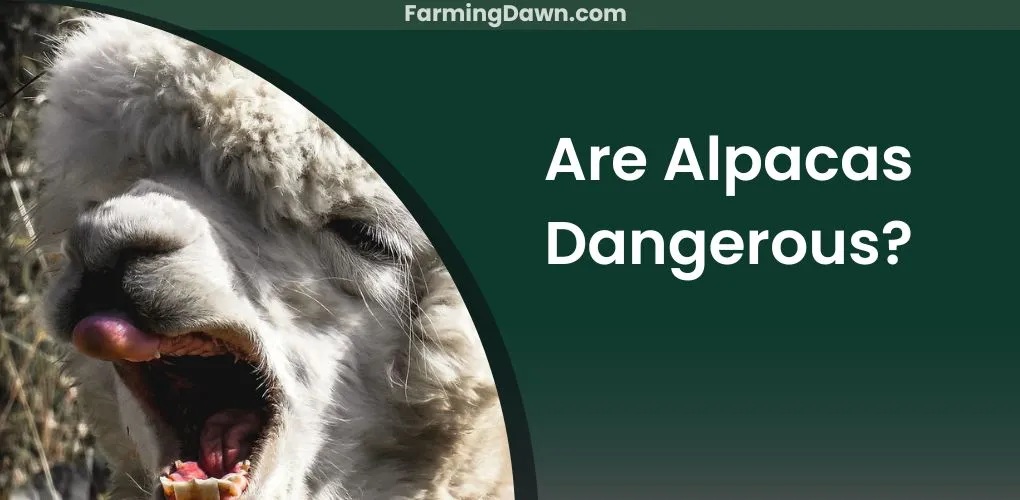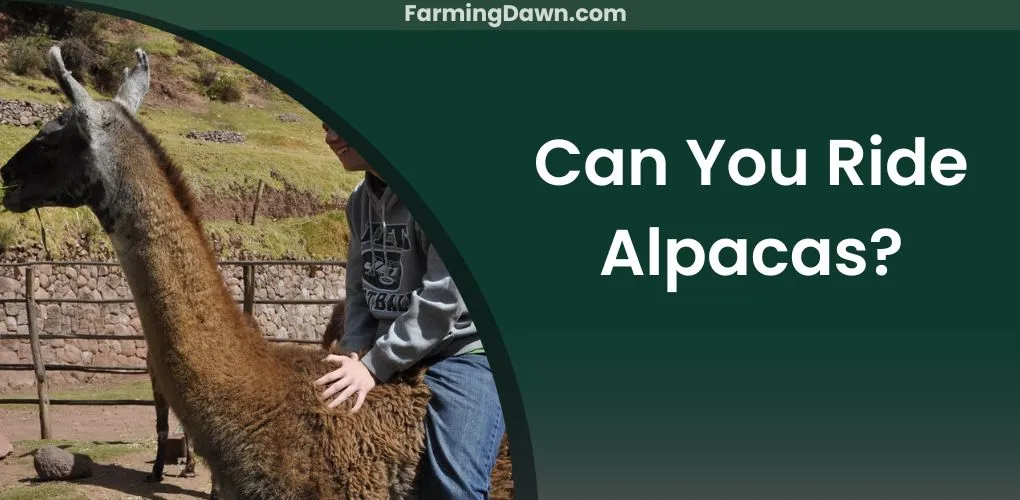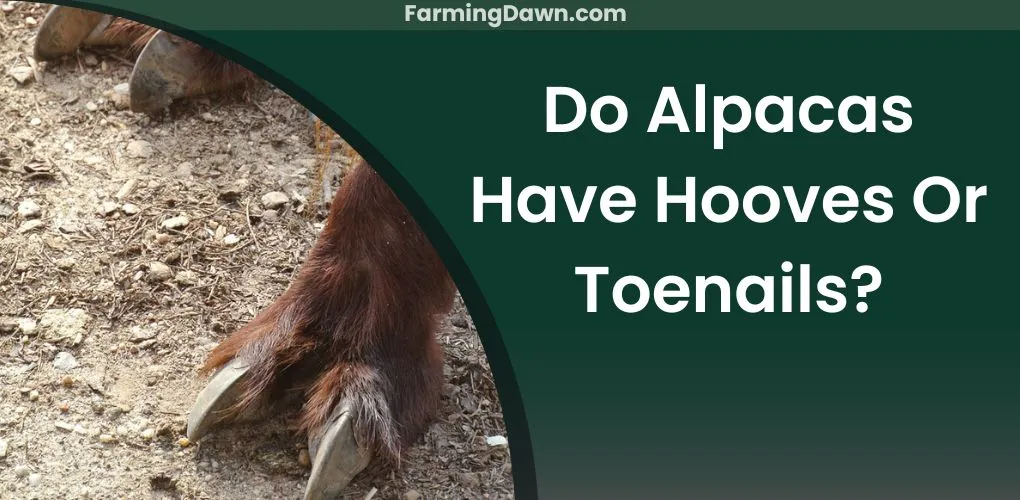Are alpacas dangerous? That’s a question many of us ask when we see these gentle-looking creatures grazing in the meadows. We want to know if they’re dangerous, or if they’ll be good friends with our kids and pets. The answer is complicated – but one thing’s for sure: alpacas are fascinating animals that deserve our respect.
So what do you need to know about alpaca safety? Do alpacas bite? How should you approach an alpaca so it doesn’t get scared? Today we will explore all these topics to understand alpaca behavior and for your safety.
Are Alpacas Dangerous?
Alpacas are generally gentle and non-aggressive animals, but that doesn’t mean they can never bite. Though alpaca aggression is rare, it’s best to be aware of potential risks when owning or coming in contact with these creatures.
Alpaca bites are caused by fear or aggressiveness towards a perceived threat, such as an unfamiliar person. If you’re interacting with an alpaca for the first time, approach them slowly and speak quietly so as not to startle them; sudden movements and loud noises may provoke their instinctual flight response.
Whether you are visiting alpacas in a zoo or park or raising them as livestock, it’s essential to respect an alpaca’s personal space and ensure children know how to safely interact with one before attempting any kind of physical contact.
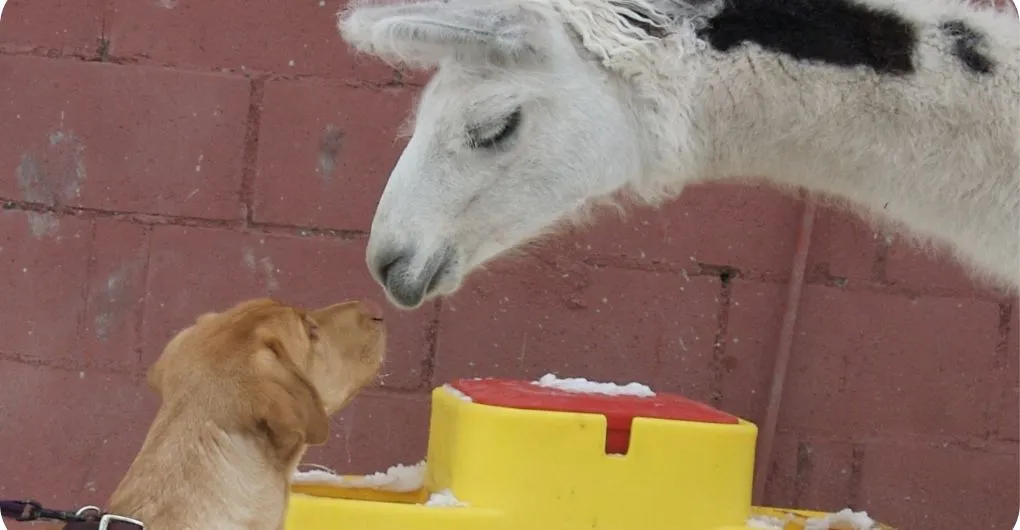
Do Alpacas Bite Or Kick?
When threatened, alpacas will use their feet as a form of defense rather than biting. They often give warning signals like making loud noises before attempting to kick an intruder who is getting too close for comfort.
Alpaca kicks can be quite powerful, so pet owners should take extra caution when approaching them! But this does not mean that alpacas cannot be tamed – with patience and care, even the timidest alpaca can become friendly enough to interact without fear of being kicked.
Although kicking is one of their main defenses, alpacas also use other methods to protect themselves from potential threats. They may flee in alarm by running away or hiding behind rocks or trees. If cornered they may try to intimidate predators with head-butting and spitting behaviors.
Alpaca spitting is a sign of the alpaca showing discomfort. This can startle intruders but rarely results in physical harm due to the softness of their coats and hooves. All these actions combined make up a complex set of defenses that help keep alpacas safe in the wild and make them gentle pets at home.
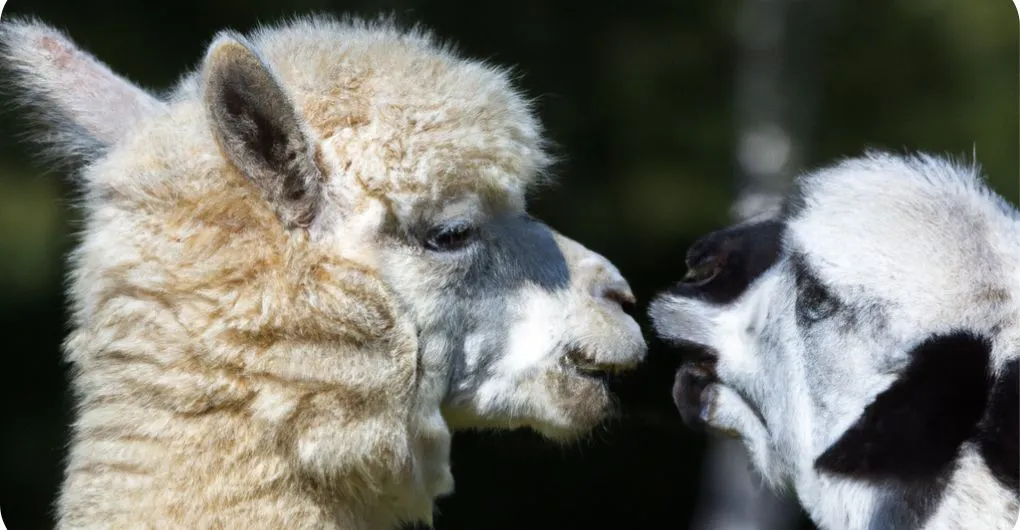
Can Alpacas Attack Humans?
Alpacas are generally very docile creatures, but that doesn’t mean they can never become aggressive. They’re just like any other animal; if provoked or threatened, they may lash out and attack. However, it’s important to note that alpaca aggression towards people is rare. Most of the time when an alpaca behaves aggressively, it’s because they feel scared or cornered by something in its environment – not necessarily a person.
There are certain triggers for alpaca aggression though. These triggers are:
- Loud noises.
- Sudden movements.
- Unfamiliar animals/objects.
- Being restrained.
If you come across an alpaca in your daily life, make sure to approach them slowly and calmly so as not to scare them. Speak softly and don’t touch them without permission from their owner first.
Shearing an alpaca once a year before the summer season arrives is essential to properly care for your gentle companions.
5 Reasons Why Alpacas May Become Aggressive
Alpacas are generally thought of as gentle and docile animals, there have been documented cases where an individual alpaca has shown signs of aggression:
Take for example a case in California in 2017. A local farmer was walking through his pasture when one of his alpacas charged him unprovoked. The animal made contact with the man before he had time to react, causing minor injuries that required medical attention.
That being said, alpacas are typically only aggressive toward humans if provoked – such as when their territory is invaded or if they feel threatened. They may also act aggressively towards other animals, particularly during mating season. Here is a list of five common instances when alpacas may become aggressive: –
- When protecting young offspring from perceived threats.
- If cornered or startled by sudden movements/noises.
- During reproductive behaviors (i.e., fighting over mates).
- To protect themselves against predators like coyotes.
- In response to unfamiliar people entering their space.
Alpacas respond differently depending on the situation and surrounding stimuli, so it’s important to understand how these animals think and behave to minimize any risk associated with them. With proper knowledge and training, an owner should be able to identify potential triggers for aggression as well as provide adequate protection for both themselves and their livestock.
Also learn the milk benefits of an alpaca.
Ways Alpacas Express Negative Feelings
Alpacas have a wide range of emotions, and when these negative feelings kick in, they express them through body language. Alpaca aggression is typically fueled by fear, so it’s important to be aware of the signs that an alpaca might be feeling uncomfortable or scared.
Alarm Hums
One way alpacas display their fear is by lying down on the ground with their legs tucked underneath them. This position is often accompanied by low-intensity humming sounds known as ‘alarm hums.’
Screaming Shears
If an alpaca feels particularly threatened, it may also begin to spin around rapidly while making higher-pitched vocalizations called ‘screaming shears’. Alpacas will only resort to this behavior as a last resort though since it expends a lot of energy and puts them at risk of being attacked themselves.
Alpaca Spitting
Alpaca spits to show negative behavior towards something that discomforts him. The spitting act as an alarming sound for predators or humans or other objects.
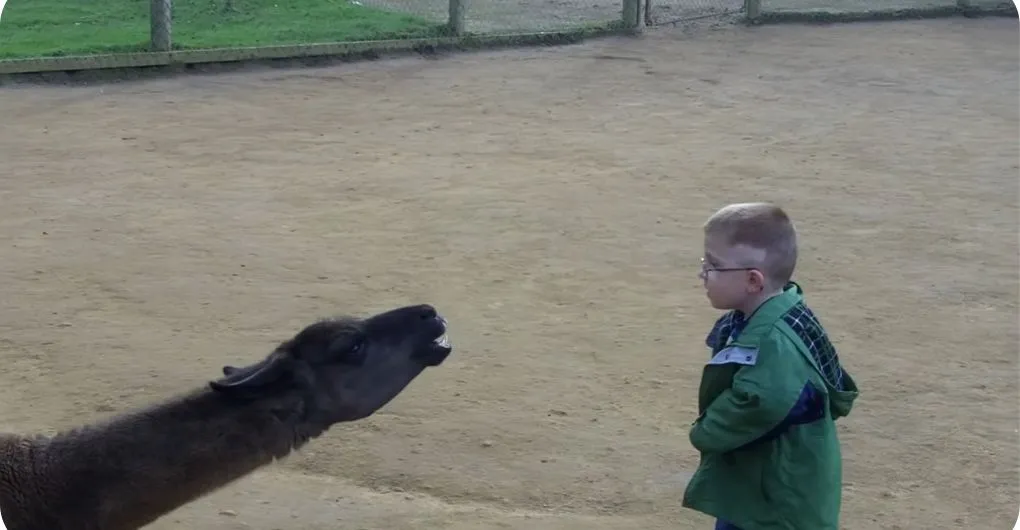
It isn’t just physical aggression that you need to watch out for; alpacas can also exhibit more subtle forms of negative emotion such as stress or anxiety. When an alpaca begins exhibiting behaviors like pacing or refusing food, it may be trying to tell you something about its emotional state.
Ways Alpacas Express Positive Feelings
Alpaca behavior is fascinating to watch: from playing tag to chasing each other around the pasture, these playful creatures can bring a smile to anyone’s face.
Alpaca Humming
Alpacas often vocalize sounds when expressing excitement or happiness; some say it’s like a donkey’s bray meets a sheep’s bleat!
By Gathering
Alpacas are social animals that enjoy gathering together for long periods, so don’t be surprised if you see them having an impromptu “alpaca party” out in the fields.
Nudges And Soft Noises
When it comes to showing affection, alpacas love attention as much as any pet. With gentle nudges and soft noises, they’ll let you know how happy they are to share your presence – why not give them a scratch behind the ears while you’re at it?
Even something as simple as feeding an alpaca a few treats can make both parties feel warm inside. It’s clear that these adorable creatures offer more than just fiber-rich wool – they provide moments that will stay in your heart forever.
How Big Do Alpacas Get?
Alpacas are a unique species, as they can grow to an average height of about 36 inches at the shoulder. Some alpacas may even be bigger than this – up to 48 inches! They usually weigh between 100 and 200 pounds, depending on their age and sex.
Guideline For Preventing Dangerous Behavior In Alpacas
The size of an alpaca may surprise you. While they appear small and cute, their presence is large in the world when it comes to aggression management.
Here are three ways to prevent dangerous behavior in alpacas:
- Provide adequate space for your alpaca(s). Make sure there’s enough room for them to roam without feeling cornered or restricted.
- Establish trust through routine handling– Get your alpaca familiar with human contact by holding, brushing, and leading them regularly so that they know who’s the boss (you!).
- Properly feed and nourish them – Take care to provide good quality hay, grasses, and supplements as part of a balanced diet for optimal health and well-being.
These simple steps will help keep everybody safe from any potential danger caused by an unhappy alpaca! When given the right amount of love, attention, nutrition, and space–alpacas can live long healthy lives as our loving partners in crime on the farm or ranch!
Are Alpacas Dangerous? Final Thoughts
As we wrap up our discussion on the topic of whether are alpacas dangerous or not? I can say that alpacas are quite docile and gentle; however, they can indeed be aggressive in certain situations. By being mindful of their emotional needs and understanding how to prevent dangerous behavior you will have a healthier relationship with your pet alpaca. As the adage goes: “Prevention is better than cure”. If you liked this post share it with your friends, who might be interested in alpaca farming.

